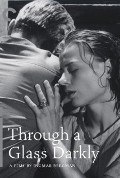
Sweden 1961
Directed by
Ingmar Bergman
89 minutes
Rated PG
Reviewed by
Bernard Hemingway

Through A Glass Darkly
The theme of Christian faith, ushered in by the well-known quotation from St Paul's letter to the Corinthians. ""For now we see through a glass darkly; but then face to face: now I know in part; but then I shall know even as I am", is explored through 4 characters who are vacationing together on a remote island (in actuality Farö which became Bergman's permanent home). Karin (Harriet Andersson) a schizophrenic, has recently been discharged from a mental clinic, her brother (Lars Passgrad) is going through the pangs of adolescent resentment, Karin's dogged husband (Max Von Sydow) is a kind of substitute father figure for their father (Gunnar Björnstrand) who is a successful novelist devoted to his career more than his family.
There is much breast-beating and an oppressive sense of pessimism as Bergman takes his scalpel to the human condition as embodied in these variously lost souls, a process beautifully aided by extracts from Bach's D Minor Cello Suite and Sven Nykvist's photography. Despite the naturalistic setting the film does not stray far from its essentially theatrical format and is more of a chamber piece with most of the emphasis lying on its intellectual content. This and the lugubrious tone makes for heavy going, the characters being more illustrative of Bergman's world view than dramatically alive in themselves whilst the attempt to inject the everyday only seems clumsily trivial compared to the endemic crises underway. The result, despite its visual clarity is in itself (it was the first of a trilogy along with Winter Light and The Silence), a rather laboured exposition of Bergman's ideas and an indication the artistic norms of the time (it won Best Foreign Film Oscar) rather than something which speaks beyond them.
Want something different?





